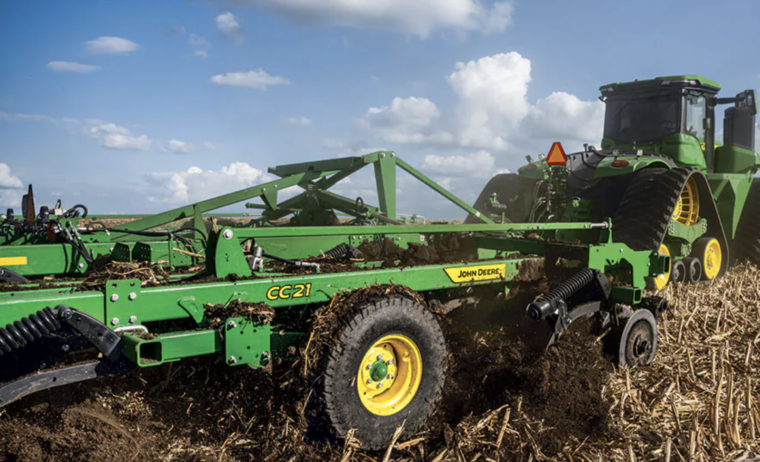A field cultivator is a must-have tool for producers looking to prepare smooth, level seedbeds ahead of planting. With sturdy tines, shanks, and sweeps, field cultivators help break up soil and create the ideal foundation for a healthy crop — whether you’re managing a small farm or hundreds of acres.
Like any machine, a field cultivator performs best when it’s properly maintained. Staying ahead of wear and tear not only keeps you moving through the season without downtime, but it also helps protect your investment for the long haul.
Here are a few maintenance tips to help keep your equipment field-ready year after year.
1. Inspect Before and After Use
Field cultivators like the John Deere 980 and John Deere 2230 are built to handle tough field conditions, but early attention to equipment issues can prevent costly repairs down the line. Before and after each use, check for loose bolts and inspect the frame for any cracks. Also look over key components like tines, shanks, and sweeps for signs of wear, bending, or breakage. Worn sweeps, for example, can affect soil penetration and lead to uneven tillage.
2. Keep Moving Parts Lubricated
Regular lubrication to moving parts ensures smooth operation and extends the lifespan of your equipment. It’s also key to maintaining performance across different soil conditions, allowing machines to run more efficiently and experience less wear over time.
Regularly apply grease to pivot points, bearings, and any high-friction areas to prevent wear and protect against rust. Without adequate lubrication, metal parts can grind against each other, speeding up wear and causing overheating or damaging critical components.
3. Monitor and Adjust Depth Settings
Maintaining consistent tillage depth is important for creating an even seedbed and ensuring uniform crop growth. It can also reduce strain on tines, shanks, and the cultivator’s frame, helping your machine run smoothly and last longer. Make sure your depth settings match your field conditions before you start a job, and make adjustments as needed.
4. Clean After Every Use
Field cultivators naturally accumulate dirt, crop residue, and debris during operation. If you don’t clean your machine regularly, this buildup can trap moisture and lead to rust, especially around moving parts and welds.
After each use, remove buildup from the frame, shanks, sweeps, and hydraulic components. A clean machine is much easier to inspect and maintain — and it’s better protected from long-term damage that could cost you time and money down the road.
5. Replace Worn Parts Promptly
Field cultivators rely on sharp, durable sweeps and shovels to penetrate and prepare the soil. Inspect these components regularly, and also check hydraulic hoses for leaks and cracks. Replacing worn parts promptly helps maintain your field cultivator’s performance and prevents additional stress on other components.
6. Store Properly in the Off-Season
Once planting is complete, don’t put your field cultivator away immediately. Prepare it for long-term storage by completing a thorough inspection, cleaning the equipment thoroughly, addressing any repairs or part replacements, and greasing all necessary points.
Whenever possible, store your field cultivator inside a shed or other covered area. If that’s not an option, use a high-quality tarp and elevate the equipment off the ground to promote air circulation. Proper off-season storage protects your equipment from harsh weather and ensures your machine is field-ready next season.
Final Thoughts
Routine maintenance goes a long way in keeping your field cultivator performing like it should. Regular inspections, lubrication, cleaning, part replacements, and smart storage practices all add up to fewer breakdowns, greater efficiency, and a smoother planting process. When you prioritize regular maintenance, you’re not just extending the lifespan of your field cultivator — you’re building a more efficient, dependable operation season after season.
Looking for a reliable field cultivator or replacement parts? Visit our dealer locator and connect with a certified John Deere dealer today.
